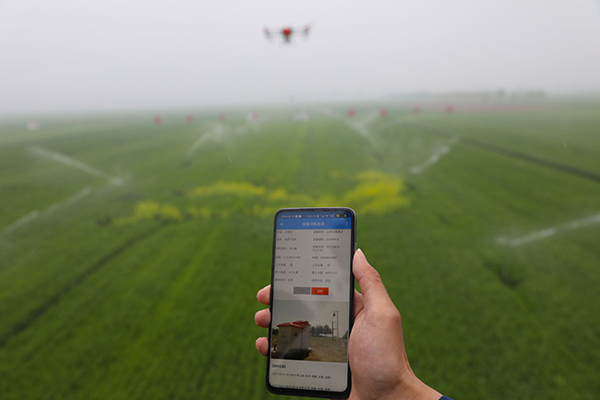
An agricultural technician uses a mobile phone to instruct a drone to spray pesticide on farmland in Weishi county, Henan province. ZHU XINGXIN/CHINA DAILY
A computer game called Happy Farm, where urban netizens can experience agriculture by planting seeds, watering crops and applying fertilizer on a virtual farm, once went viral in China.
It turned out that some agricultural games are more than just games, as modern technology has transformed imagination into reality.
Like those in the games, farmers in Weishi county in Kaifeng, Henan province, can see how their crops are doing through an app on their mobile phones.
They can press a button on the app, developed by Henan Ruitong Irrigation Equipment, and the sprinklers will open automatically to conduct irrigation. With the press of another button, fertilizer mixed with water will flow into the farmland through underground pipes. Additionally, the amount of water and electricity used on the farm can be tracked on the app in real time.
"In the past, farmers had to carry heavy bags and farm tools to work. But now, they don't even have to visit the farmland in person," said Yang Yawei, general manager of Henan Ruitong.
At the 666-hectare demonstration area for high-standard intelligent wheat farmland in Shenjia village in the town of Zhangshi in Weishi, sprinklers can spray water in different directions while an unmanned aerial vehicle, or drone, flies high to spread pesticide following instructions that Yang makes on his phone.
"The method can largely save resources," he said. "Targeted irrigation saves 60 percent of water, and the use of fertilizers has been cut by half."
On big LED screens near the farmland, information such as the temperature, humidity, wind speed, rainfall and sunlight is shown. The screens aim to make every element influencing agriculture visible and controllable, Yang said.
The onset of plant diseases and pests can also be forecast seven to 10 days in advance to enable farmers to take timely measures, he said. A machine connected to the internet can automatically hunt, recognize and kill pests, as well as upload information about them.
With targeted digital management, production of wheat in the farmland is increasing, he added.
"Going digital" has been a hot phrase in many industries in the country in recent years as more tools such as 5G and big data are introduced to reduce repetitive labor, lower costs and boost efficiency.
Weishi, where 767,000 of the 1.02 million residents are involved in agriculture, was one of the first places in China to develop modern intelligent agriculture, conforming to the country's plan since 2013 to ensure food security by developing high-standard farmland empowered by advanced technology.
The county has invested over 1 billion yuan ($154 million) in recent years to establish 56,000 hectares of high-standard intelligent farmland. Annual production of crops has exceeded 650,000 metric tons, and per capita disposable income reached 16,458 yuan last year, according to the local government.
Villager Lu Aidong told China Central Television that it used to be challenging to take care of his 26 hectares of land.
"My family used to water the crops by riding a tractor. It took a day to water 0.2 to 0.3 of a hectare. But now, I can water 2 to 3 hectares of land a day myself with the phone," he said.
Zhangshi, which relies heavily on crops-wheat, pepper, watermelon and corn-created a highly automatic and full-chain management method, from planting to harvest, to develop its economy and enrich its people.
"Farming has become much easier. It takes three days to spread pesticide by UAVs to cover all 5,200 hectares of our farmland," said Lou Shiqiang, Party secretary of the town. "Harvesters can now reap wheat in five days. By human labor, it used to take a month."
He said most farmers there have transferred their land to a company to manage. They can also invest in the company and wait for dividends at the end of the year, and they can receive agricultural subsidies.
"Farmers barely need to see the farmland at all," Lou said.
Costs have also been significantly cut. In the past, it used to cost about 1,166 yuan to water 1 hectare of farmland, but now it costs only 116 yuan as technological tools can precisely calculate the water required, he said.
"Agricultural vitalization depends on technology. The goal is to enrich people by agriculture and boost revenue through business scale and higher quality," Lou said.
Shen Wenzheng, a 35-year-old former migrant worker from Zhangshi, said his life greatly improved after he returned home and started an agricultural business.
In 2015, he established a cooperative that provides services for farmers such as plowing, planting and harvesting assistance through drones and large agricultural equipment. The co-op's revenue increased from 1 million yuan in 2015 to 8 million yuan last year, and net profit reached about 2 million yuan, Shen said.
He said he has bought several cars and houses, and his income has become more stable. "Few villagers at my age are willing to do agriculture. But now, I can assure them that the industry has great potential," he said.